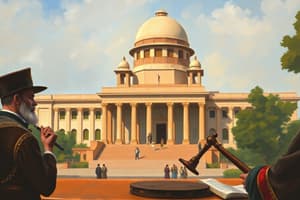Podcast
Questions and Answers
What article of the Indian Constitution guarantees equality before the law?
What article of the Indian Constitution guarantees equality before the law?
- Article 14 (correct)
- Article 21
- Article 16
- Article 46
The Rule of Law in India states that government officials are above the law.
The Rule of Law in India states that government officials are above the law.
False (B)
Name one key feature of Social Justice in India.
Name one key feature of Social Justice in India.
Affirmative Action
Article ___ of the Indian Constitution promotes equality and prohibits discrimination.
Article ___ of the Indian Constitution promotes equality and prohibits discrimination.
Match the following components of the Rule of Law with their descriptions:
Match the following components of the Rule of Law with their descriptions:
Which of the following is a challenge to the Rule of Law in India?
Which of the following is a challenge to the Rule of Law in India?
Economic inequality is not considered a challenge to Social Justice in India.
Economic inequality is not considered a challenge to Social Justice in India.
What issue does caste discrimination hinder in the context of Social Justice?
What issue does caste discrimination hinder in the context of Social Justice?
Flashcards are hidden until you start studying
Study Notes
Rule of Law in India
- Definition: The principle that law applies equally to all individuals, ensuring accountability and justice.
- Constitutional Basis: Article 14 guarantees equality before the law and equal protection of the laws.
- Key Features:
- Supremacy of Law: No one is above the law, including government officials.
- Access to Justice: Mechanisms exist to ensure that all citizens can seek legal redress.
- Judicial Independence: Courts operate independently from the executive and legislative branches.
- Challenges:
- Corruption: Erosion of trust in legal institutions due to corrupt practices.
- Delay in Justice: Overburdened courts lead to prolonged legal proceedings.
- Access Issues: Socio-economic barriers prevent disadvantaged groups from accessing legal recourse.
Social Justice in India
- Definition: The pursuit of a fair and just society by addressing inequalities and ensuring equitable distribution of resources and opportunities.
- Constitutional Mandate: Articles 15, 16, and 46 promote equality, prohibit discrimination, and protect weaker sections of society.
- Key Components:
- Affirmative Action: Reservations in education and employment for Scheduled Castes, Scheduled Tribes, and Other Backward Classes.
- Rights-Based Approach: Emphasis on fundamental rights, including the Right to Education and Right to Work.
- Social Welfare Schemes: Government initiatives aimed at poverty alleviation and empowerment of marginalized communities.
- Challenges:
- Caste Discrimination: Persistent social stratification and discrimination based on caste.
- Economic Inequality: Significant disparities in wealth and access to resources.
- Gender Inequality: Ongoing issues related to women's rights and gender-based violence.
Relationship between Rule of Law and Social Justice
- Interdependence: Rule of law is essential for achieving social justice; equitable application of laws protects the rights of marginalized groups.
- Legal Framework: Laws must be designed to promote social justice while remaining consistent with the rule of law.
- Judicial Activism: Courts often play a critical role in interpreting laws to advance social justice, especially in landmark cases addressing discrimination and inequality.
Rule of Law in India
- Principle ensuring that the law applies equally to all individuals, thereby promoting accountability and justice.
- Article 14 of the Constitution mandates equality before the law and equal protection under the law for all citizens.
- Supremacy of Law: Asserts that no individual or government official is above the law.
- Access to Justice: Frameworks in place to enable all citizens to seek legal remedies effectively.
- Judicial Independence: Courts function independently from executive and legislative influences, preserving impartiality.
- Corruption Challenges: Corruption undermines trust in judicial and legal institutions, complicating the pursuit of justice.
- Delay in Justice: Court backlogs contribute to prolonged legal proceedings, impacting timely justice delivery.
- Access Issues: Socio-economic disparities create barriers for disadvantaged groups to access legal services.
Social Justice in India
- Pursuit of an equitable society that addresses systemic inequalities and promotes fair distribution of resources and opportunities.
- Articles 15, 16, and 46 of the Constitution emphasize equality, prohibit discrimination, and protect the rights of marginalized populations.
- Affirmative Action: Implementation of reservation policies in education and public employment for Scheduled Castes, Scheduled Tribes, and Other Backward Classes.
- Rights-Based Approach: Focus on advancing fundamental rights, including the Right to Education and the Right to Work.
- Social Welfare Schemes: Government initiatives target poverty reduction and empowerment of marginalized communities, aiming for inclusion.
- Caste Discrimination: Ongoing social stratification and discrimination based on caste continue to hinder social justice efforts.
- Economic Inequality: Persistent disparities in wealth and access to resources exacerbate social injustices.
- Gender Inequality: Significant challenges related to women's rights and gender-based violence persist within society.
Relationship between Rule of Law and Social Justice
- The rule of law is foundational for achieving social justice; equitable legal application supports the rights of marginalized groups.
- Legal frameworks must not only adhere to the rule of law but also facilitate the promotion of social justice.
- Judicial activism plays a vital role as courts interpret laws to enhance social justice, especially regarding landmark rulings addressing discrimination and inequality.
Studying That Suits You
Use AI to generate personalized quizzes and flashcards to suit your learning preferences.




